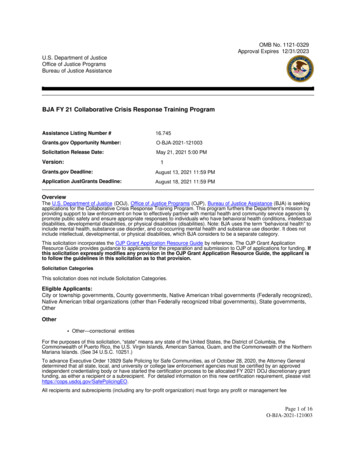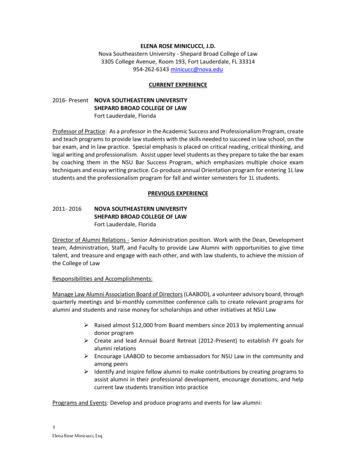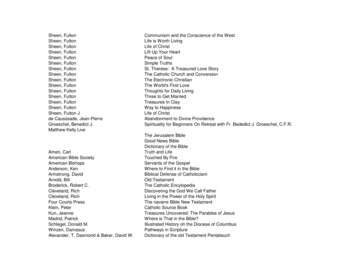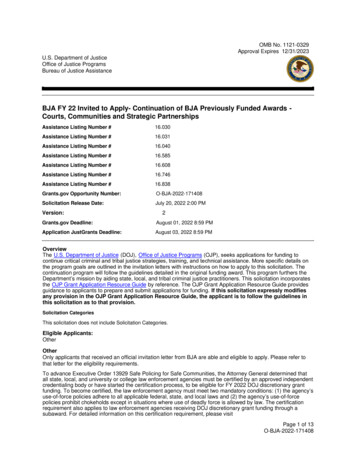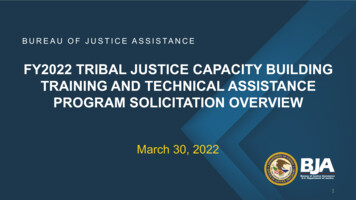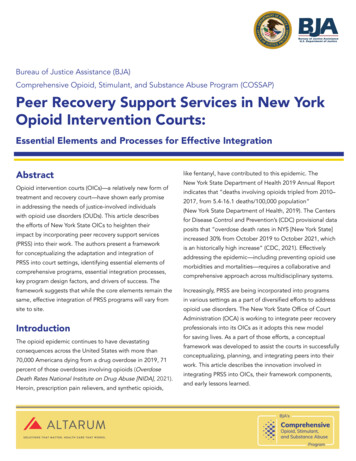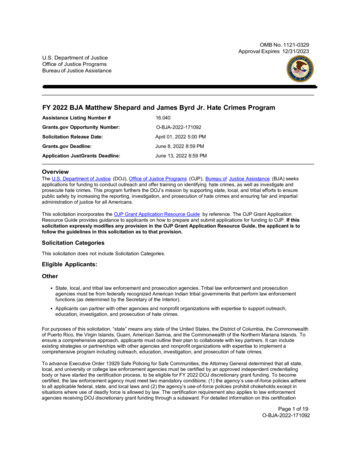
Transcription
OMB No. 1121-0329Approval Expires 12/31/2023U.S. Department of JusticeOffice of Justice ProgramsBureau of Justice AssistanceFY 2022 BJA Matthew Shepard and James Byrd Jr. Hate Crimes ProgramAssistance Listing Number #16.040Grants.gov Opportunity Number:O-BJA-2022-171092Solicitation Release Date:April 01, 2022 5:00 PMGrants.gov Deadline:June 8, 2022 8:59 PMApplication JustGrants Deadline:June 13, 2022 8:59 PMOverviewThe U.S. Department of Justice (DOJ), Office of Justice Programs (OJP), Bureau of Justice Assistance (BJA) seeksapplications for funding to conduct outreach and offer training on identifying hate crimes, as well as investigate andprosecute hate crimes. This program furthers the DOJ’s mission by supporting state, local, and tribal efforts to ensurepublic safety by increasing the reporting, investigation, and prosecution of hate crimes and ensuring fair and impartialadministration of justice for all Americans.This solicitation incorporates the OJP Grant Application Resource Guide by reference. The OJP Grant ApplicationResource Guide provides guidance to applicants on how to prepare and submit applications for funding to OJP. If thissolicitation expressly modifies any provision in the OJP Grant Application Resource Guide, the applicant is tofollow the guidelines in this solicitation as to that provision.Solicitation CategoriesThis solicitation does not include Solicitation Categories.Eligible Applicants:OtherState, local, and tribal law enforcement and prosecution agencies. Tribal law enforcement and prosecutionagencies must be from federally recognized American Indian tribal governments that perform law enforcementfunctions (as determined by the Secretary of the Interior).Applicants can partner with other agencies and nonprofit organizations with expertise to support outreach,education, investigation, and prosecution of hate crimes.For purposes of this solicitation, “state” means any state of the United States, the District of Columbia, the Commonwealthof Puerto Rico, the Virgin Islands, Guam, American Samoa, and the Commonwealth of the Northern Mariana Islands. Toensure a comprehensive approach, applicants must outline their plan to collaborate with key partners. It can includeexisting strategies or partnerships with other agencies and nonprofit organizations with expertise to implement acomprehensive program including outreach, education, investigation, and prosecution of hate crimes.To advance Executive Order 13929 Safe Policing for Safe Communities, the Attorney General determined that all state,local, and university or college law enforcement agencies must be certified by an approved independent credentialingbody or have started the certification process, to be eligible for FY 2022 DOJ discretionary grant funding. To becomecertified, the law enforcement agency must meet two mandatory conditions: (1) the agency’s use-of-force policies adhereto all applicable federal, state, and local laws and (2) the agency’s use-of-force policies prohibit chokeholds except insituations where use of deadly force is allowed by law. The certification requirement also applies to law enforcementagencies receiving DOJ discretionary grant funding through a subaward. For detailed information on this certificationPage 1 of 19O-BJA-2022-171092
requirement, please visit https://cops.usdoj.gov/SafePolicingEO to access the Standards for Certification on Safe Policingfor Safe Communities, the Implementation Fact Sheet, and the List of Designated Independent Credentialing Bodies.All recipients and subrecipients (including any for-profit organization) must forgo any profit or management fee.BJA will consider applications under which two or more entities would carry out the federal award; however, only oneentity may be the applicant. Any others must be proposed as subrecipients (subgrantees). For additional information onsubawards, see the OJP Grant Application Resource Guide.BJA may elect to fund applications submitted under this FY 2022 solicitation in future fiscal years, dependent on, amongother considerations, the merit of the applications and the availability of appropriations.Contact InformationFor technical assistance with submitting the Application for Federal Assistance standard form (SF)-424 and a Disclosureof Lobbying Activities form (SF-LLL) in Grants.gov, contact the Grants.gov Customer Support Hotline at 800-518-4726,606-545-5035, Grants.gov Customer Support, or support@grants.gov. The Grants.gov Support Hotline operates 24hours a day, 7 days a week, except on federal holidays.For technical assistance with submitting the full application in DOJ’s Justice Grants System (JustGrants), contact theJustGrants Service Desk at 833-872-5175 or JustGrants.Support@usdoj.gov. The JustGrants Service Desk operates 5a.m. to 9 p.m. eastern time Monday–Friday and 9 a.m. to 5 p.m. Saturday, Sunday, and federal holidays.For assistance with any other requirements of this solicitation, contact the OJP Response Center by telephone at800-851-3420 or TTY: 301-240-6310 (hearing impaired only), or by email at grants@ncjrs.gov. The OJP ResponseCenter hours of operation are 10:00 a.m. to 6:00 p.m., eastern time Monday–Friday, and 10:00 a.m. to 8:00 p.m. on thesolicitation closing date.Submission InformationApplications will be submitted to DOJ in two steps:Step 1: The applicant must submit by the Grants.gov deadline the required Application for Federal Assistance standardform (SF)-424 and a Disclosure of Lobbying Activities (SF-LLL) form when they register in Grants.gov athttps://www.grants.gov/web/grants/register.html. To register in Grants.gov, the applicant will need to ensure that itsSystem for Award Management (SAM) registration is current.Step 2: The applicant must then submit the full application including attachments in JustGrants atJustGrants.usdoj.gov. To be considered timely, the full application must be submitted in JustGrants by theJustGrants application deadline. OJP encourages applicants to review, the “How to Apply" section in the OJP GrantApplication Resource Guide and the JustGrants website for more information, resources, and training.Page 2 of 19O-BJA-2022-171092
ContentsContact InformationProgram DescriptionOverviewStatutory AuthoritySpecific InformationGoals, Objectives, Deliverables, and TimelineEvidence-Based Programs or PracticesInformation Regarding Potential Evaluation of Programs and ActivitiesOJP Priority AreasFederal Award InformationAwards, Amounts and DurationsContinuation Funding IntentAvailability of FundsTypes of AwardsFinancial Management and System of Internal ControlsBudget InformationCost Sharing or Matching RequirementPre-agreement Costs (also known as Pre-award Costs)Limitation on Use of Award Funds for Employee Compensation: WaiverPrior Approval, Planning, and Reporting of Conference/Meeting/Training CostsCosts Associated with Language Assistance (if applicable)Eligibility InformationApplication and Submission InformationInformation to Complete the Application for Federal Assistance (SF-424)Standard Applicant Information (JustGrants 424 and General Agency Information)Proposal AbstractProposal NarrativeNarrative outline/selection criteriaGoals, Objectives, Deliverables, and TimelineBudget and Associated DocumentationBudget Worksheet and Budget Narrative (Web-based Form)Indirect Cost Rate Agreement (if applicable)Financial Management Questionnaire (including applicant disclosure of high-risk status)Disclosure of Process Related to Executive CompensationAdditional Application ComponentsCurriculum Vitae or ResumesTribal Authorizing ResolutionTimeline FormLetters of SupportResearch and Evaluation Independence and Integrity StatementDisclosures and AssurancesDisclosure of Lobbying ActivitiesDOJ Certified Standard AssurancesApplicant Disclosure of Duplication in Cost ItemsDOJ Certifications Regarding Lobbying; Debarment, Suspension and Other ResponsibilityMatters; and Drug-Free Workplace RequirementsApplicant Disclosure and Justification – DOJ High Risk Grantees (if 13131313131313131313141414141414Page 3 of 19O-BJA-2022-171092
How to ApplySubmission Dates and TimeApplication Review InformationReview CriteriaOther Review Criteria/FactorsReview ProcessFederal Award Administration InformationFederal Award NoticesAdministrative, National Policy, and Other Legal RequirementsInformation Technology (IT) Security ClausesGeneral Information about Post-Federal Award Reporting RequirementsFederal Awarding Agency Contact(s)Other InformationFreedom of Information and Privacy Act (5 U.S.C. 552 and 5 U.S.C. 552a)Provide Feedback to OJPPerformance MeasuresApplication ChecklistApplication Checklist:141415151515161616161616161717171717Page 4 of 19O-BJA-2022-171092
Program DescriptionOverviewOJP is committed to advancing work that promotes civil rights and racial equity, increases access to justice, supportscrime victims and individuals impacted by the justice system, strengthens community safety and protects the public fromcrime and evolving threats, and builds trust between law enforcement and the community. The Matthew Shepard andJames Byrd, Jr. Hate Crimes Program supports efforts by state, local, and tribal law enforcement and prosecutionagencies and their partners in conducting outreach, educating practitioners and the public, enhancing victim reportingtools, and investigating and prosecuting hate crimes committed on the basis of a victim’s perceived or actual race, color,religion, national origin, sexual orientation, gender, gender identity, or disability.Statutory AuthorityAny awards under this solicitation would be made under the Department of Justice Appropriations Act, 2022(Pub. L. No. 117-103).Specific InformationThe Matthew Shepard and James Byrd, Jr. Hate Crimes Program (Shepard/Byrd Hate Crimes Program) supports state,local, and tribal law enforcement and prosecution agencies in their outreach to and education of the public, victims, andtheir staff and partners on hate crimes. This program also supports the investigation and prosecution of hate crimes. Hatecrimes (sometimes called bias-motivated crimes) are criminal offenses motivated by some form of bias toward a victim onthe basis of their perceived or actual race, color, religion, national origin, sexual orientation, gender, gender identity, ordisability.In response to the increase in hate crimes, particularly involving Asian Americans, BJA is seeking applications that employa comprehensive approach to prevent and address hate crimes, including outreach to and education of the public andvictims, education of law enforcement and prosecution staff and partners, response to hate incidents and crimes, and theinvestigation and prosecution of these hate crimes. Funding can also be used to address serial violent hate crimeperpetrators (having or suspected of having committed more than one violent hate crime).According to the U.S. Bureau of Justice Statistics’ (BJS) National Crime Victimization Survey (NCVS):In 2019, there was 1 violent hate crime victimization per 1,000 persons age 12 or older.During the 5-year aggregate period of 2015–2019, nearly 90 percent of all hate crimes captured by NCVS wereviolent crimes, while 10 percent were property crimes.A bias against the victim’s race, ethnicity, or national origin was the most common motivation for nonfatal violenthate crimes during 2015–2019.The Federal Bureau of Investigation reported the following hate crimes in calendar year 2020:There were 8,052 single-bias incidents involving 11,126 victims. A percent distribution of victims by bias type shows that61.8 percent of victims were targeted because of a bias based on race/ethnicity/ancestry; 20.0 percent were victimizedbecause of a bias based on sexual orientation; 13.3 percent were targeted because of a bias based on religion; 2.7percent were targeted because of a bias based on gender identity; 1.4 percent were victimized because of a bias basedon disability; and 0.7 percent were victimized because of a bias based on gender.Of the 11,129 hate crime offenses reported, 69.6 percent were crimes against persons; 28.2 percent were crimes againstproperty; and 2.2 percent were crimes against society.Moreover, there has been a precipitous increase in hate crimes against Asian Americans. Recent research found thatanti-Asian hate crimes reported to police in 16 of America’s largest cities and counties rose 164 percent in the first quarterof 2021 in comparison to the first quarter of 2020. The 2021 data accounted for over 20 percent of all FBI-reported hatecrimes in 2019, covering about 9 percent of the nation’s population. In North America, larger cities with a higherpercentage of Asian residents that also have hate crime units, victim outreach, and a lengthy history of data collectionwere those most likely to show higher numerical and percentage increases. Also, 2021’s first-quarter increase follows ahistoric surge in anti-Asian hate crime that started in 2020, with anti-Asian hate crime in 16 of America’s largest citiesincreasing 149 percent in 2020. The first spike occurred in March and April of 2020 concurrently with a rise in COVIDcases and negative stereotyping of Asians related to the pandemic. In addition, in 2021 and 2022, there have been anumber of attacks on houses of worship and threats against historically Black colleges and universities.Page 5 of 19O-BJA-2022-171092
This funding is designed to assist jurisdictions in addressing hate crimes and to assist victims and communities that arefacing an increase in hate crimes. The Shepard/Byrd Hate Crimes Program explores opportunities to support andencourage the establishment of partnerships between law enforcement and prosecution agencies and community-basedorganizations to prevent discrimination, bullying, harassment, and hate crimes, as well as expand the confidence ofvictims to report hate incidents and crimes.Hate crimes can be more violent and involve greater victim injury as compared to other victimizations, yet they aresubstantially underreported. Victim reluctance to contact law enforcement may arise from perceptions of police bias,distrust of law enforcement or the criminal justice system, or barriers such as language or concerns about theirimmigration status. As law enforcement agencies use data to inform their strategies and allocation of resources, this canpose a unique challenge in addressing hate crimes. This underreporting and identification of hate crimes can also growout of a lack of training and understanding on the part of law enforcement and prosecutors resulting in their inability toidentify, report, or charge these crimes and effectively investigate or prosecute these cases.Hate crimes have a devastating effect beyond the harm inflicted on any one victim. They reverberate through families,communities, and the entire nation as others fear that they too may be threatened, attacked, or forced from their homesbecause of what they look like, who they are, where they worship, who they love, or whether they have a disability. Likeother crimes, the vast majority of hate crimes in the United States are investigated under state law and prosecuted bylocal, state, and tribal authorities.The federal government also has an important role to play in addressing hate crimes through collaboration with state,local, and tribal partners. Eliminating hate crimes and bias-motivated violence from communities and the country is one ofthe Department’s highest priorities. The Department’s Hate Crimes Enforcement and Prevention Initiative is charged withcoordinating DOJ’s efforts to eradicate hate crimes, in part by facilitating training, outreach, and education to lawenforcement agencies and the public at the federal, state, local, and tribal levels. This work is collaborative and includesDOJ’s Civil Rights Division, the Community Relations Service, U.S. Attorneys’ Offices (USAOs), the Federal Bureau ofInvestigation (FBI), the Office of Community Oriented Policing Services, and other agencies in the Office of JusticePrograms such as the Office for Victims of Crime and the Bureau of Justice Statistics. For more information on the work ofthese agencies and opportunities to build on this work, see: www.justice.gov/hatecrimes.Identifying, investigating, and reporting hate crimes when they occur help ensure that data is complete and accurate andallow appropriate resources to be directed toward solving and preventing hate crimes. Law enforcement and prosecutors’offices are a key part of this strategy, and through the Shepard/Byrd Hate Crimes Program can lead collaborativeapproaches that prevent and respond to these crimes. A comprehensive report was issued in 2020 entitled Improving theIdentification, Investigation, and Reporting of Hate Crimes: A Summary Report of the Law Enforcement Roundtable(August 2020). The “Roundtable Report” sets forth key recommendations and action steps to combat hate crimes and canbe found at: https://cops.usdoj.gov/RIC/ric.php?page detail&id COPS-W0895.Applicants are encouraged to work with their federal partners to coordinate the review of case files and evidence relatedto potential cases and pursue these cases consistent with the Shepard/Byrd Hate Crimes Act. This should include therelevant field office of the FBI and the civil rights coordinator in their USAO districts. To effectively approach this work,applicants should also develop strategies in coordination with community-based partners and state, local, and tribalagencies to form collaborative approaches or task forces that can help to address the concerns and needs of all affectedparties. This includes strategies to increase trust and reporting of incidents to law enforcement, and expand outreach toand education of the public and those persons and groups disproportionately impacted by these crimes. BJA alsoencourages partnerships with schools, colleges, and universities in an applicant’s jurisdiction as part of these strategies.OJP has several other programs that can support jurisdictions seeking to address hate crimes, including funding toprevent and address school-based violence, training on restorative justice approaches, and funding to support victims ofhate crimes.To assist law enforcement and prosecutors in pursuing these cases, BJA recently selected a team of training andtechnical assistance (TTA) providers to assist grantees and the field at large. BJA’s overall TTA will include individualized,efficient, and consistent delivery in order to help grantees accomplish their goals by the end of the project period. BJA andthe TTA partners will assess their needs and develop training, targeted technical assistance, and tools for the field. Thiswill include ongoing coaching and dialogue, as well as support for peer-to-peer dialogue and training, knowledge diffusionproducts, grantee learning communities, dissemination of best practices and lessons learned, and a listserv.As part of this application, applicants must document their plans to ensure they have a set of diverse staff, partners,and/or subject matter experts who reflect a mix of experiences and perspectives to effectively reach the communities andpractitioners that they will serve.Page 6 of 19O-BJA-2022-171092
For more information, see Matthew Shepard and James Byrd, Jr. Hate Crimes Program, Overview, Bureau of JusticeAssistance (ojp.gov).Goals, Objectives, Deliverables, and TimelineGoalsTo comprehensively address and prevent hate crimes through increased public awareness and reporting of hatecrimes and enhance law enforcement and prosecution strategies to prevent and respond to hate crimes, therebybringing justice for hate crime victims and other stakeholders.ObjectivesBuild strong collaboration between law enforcement and prosecution and community-based organizations —including schools, colleges, and universities — to conduct outreach to and education of persons and groups at riskfor hate crimes.Build comprehensive approaches that expand and enhance strategies — including tools, policies, and procedures— to increase the reporting, identification, and charging of hate crimes, including victim reporting.Enhance the capacity of law enforcement and prosecutors to prevent and address hate crimes through education,training, and tools for the field to investigate and prosecute hate crime cases.Enhance collaboration between federal, state, local, and tribal law enforcement and prosecution agencies in theirinvestigation and prosecution of hate crimes. Prepare the partners to be able to fully understand and address hatecrimes through leadership and assessment of their organizational cultures.DeliverablesDeliverables will include:An inventory of potential cases and creation of an action plan during the first 6 months to build a strong andfocused strategy.The action plan must be submitted and approved by BJA prior to implementation. BJA, the TTA providers, and thegrantee will use this action plan to guide and track progress toward the project’s objectives.Successful implementation of the action plan, resulting in the prosecution and resolution of cases, workingcollaboratively with BJA staff and the TTA partners.Enhanced partnerships with federal, state, tribal, or local organizations.Documentation of efforts to share lessons learned from program implementation, including a final report. Thisinformation will be publicly shared to assist the field.The Goals, Objectives, and Deliverables are directly related to the performance measures that show the completed work’sresults, as discussed in the Application and Submission Information section.Evidence-Based Programs or PracticesOJP strongly encourages the use of data and evidence in policymaking and program development for criminal justice,juvenile justice, and crime victim services. For additional information and resources on evidence-based programs orpractices, see the OJP Grant Application Resource Guide.Information Regarding Potential Evaluation of Programs and ActivitiesOJP may conduct or support an evaluation of the programs and activities funded under this solicitation. For additionalinformation, see the OJP Grant Application Resource Guide section entitled “Information Regarding Potential Evaluationof Programs and Activities.”Page 7 of 19O-BJA-2022-171092
OJP Priority AreasThe Department of Justice is committed to advancing work that promotes civil rights and racial equity, increases access tojustice, supports crime victims and individuals impacted by the justice system, strengthens community safety and protectsthe public from crime and evolving threats, and builds trust between law enforcement and the community.Priority Considerations Supporting Executive Order 13985, Advancing Racial Equity and Support for UnderservedCommunities Through the Federal GovernmentConsistent with this Executive Order, the term “underserved community” refers to a population sharing a particularcharacteristic, as well as a geographic community, that has been systematically denied a full opportunity to participate inaspects of economic, social, and civic life or whose members have been historically underserved, marginalized, andadversely affected by inequality. Such communities include, among others, Black people, Hispanics and Latino/a/epeople, Native American and other Indigenous peoples of North America (including Alaska Natives, Eskimos, and Aleuts),Asian Americans, Native Hawaiians, and Pacific Islanders.In support of Executive Order 13985, OJP will:A. Give priority consideration to applications that include project(s) that will promote racial equity and the removal ofbarriers to access and opportunity for communities that have been historically underserved, marginalized, and adverselyaffected by inequality, when making award decisions.To receive this consideration, the applicant must describe how the proposed project(s) will address potential inequitiesand barriers to equal opportunity, and/or contribute to greater access to services for underserved and historicallymarginalized populations.B. Give priority consideration to applicants that can demonstrate that their capabilities and competencies forimplementing their proposed project(s) are enhanced because the applicant (or at least one proposed subrecipient thatwill receive at least 30 percent of the requested award funding, as demonstrated in the budget worksheet and budgetnarrative) identifies as a culturally specific organization. To receive this additional priority consideration, applicants mustdescribe how being a culturally specific organization (or funding the culturally specific subrecipient organization(s)) willenhance their ability to implement the proposed project(s) and should also specify which culturally specific populations areintended or expected to be served or to have their needs addressed under the proposed project(s).Culturally specific organizations are defined for purposes of this solicitation as private nonprofit or tribal organizationswhose primary purpose as a whole is to provide culturally specific services to, among others, Black people, Hispanics andLatino/a/e people, Native American and other Indigenous peoples of North America (including Alaska Natives, Eskimos,and Aleuts), Asian Americans, Native Hawaiians, and/or Pacific Islanders.Note: Addressing these priority areas is one of many factors that OJP considers in making funding decisions. Receivingpriority consideration for one or more priority areas is not a guarantee of an award.Federal Award InformationSolicitation CategoriesThis solicitation does not include Solicitation Categories.Awards, Amounts and DurationsAnticipated Number of Awards22Anticipated Maximum Dollar Amount of Awards 400,000.00Period of Performance Start Date10/1/22 12:00 AMPeriod of Performance Duration (Months)48Anticipated Total Amount to be Awarded UnderSolicitation 8,700,000.00Page 8 of 19O-BJA-2022-171092
Continuation Funding IntentBJA may, in certain cases, provide additional funding in future years to awards made under this solicitation throughcontinuation awards. OJP will consider, among other factors, OJP’s strategic priorities, a recipient’s overall managementof the award, and the award-funded work’s progress when making continuation award decisions.Availability of FundsThis solicitation, and awards (if any are made) under this solicitation, are subject to the availability of appropriated fundsand to any modifications or additional requirements that may be imposed by the agency or by law. In addition, nothing inthis solicitation is intended to, and does not, create any right or benefit, substantive or procedural, enforceable at law or inequity by any party against the United States; its departments, agencies, or entities; its officers, employees, or agents; orany other person.Types of AwardsBJA expects to make awards under this solicitation as grants. See the “Administrative, National Policy, and Other LegalRequirements” section of the OJP Grant Application Resource Guide for a brief discussion of important statutes,regulations, and award conditions that apply to many (or in some cases, all) OJP grants.Financial Management and System of Internal ControlsAward recipients and subrecipients (including recipients or subrecipients that are pass-through entities) must, asdescribed in the Part 200 Uniform Requirements as set out at 2 C.F.R. 200.303, comply with standards for financial andprogram management. See OJP Grant Application Resource Guide for additional information.Budget InformationApplicants should outline their expenses on an annual basis consistent with the budget worksheet. The funding requestedmust not exceed 100,000 per year for a total of no more than 400,000 for a 48-month project period.Allowable uses of funding include resources for outreach, education, reporting and identifying, and investigation andprosecution of hate crimes.The use of BJA grant funds for unmanned aircraft systems (UAS), including unmanned aircraft vehicles (UAV), and/or anyaccompanying accessories to support UAS or UAV devices/systems, is unallowable.Applicants should budget for travel for at least two team members to attend an in-person, 2-day grantee meeting as partof their projects, and assume that the trip will be in a location that requires air travel costing at least 500 per person. Forestimates of costs for hotel and lodging, the trip should include General Services Administration (GSA) rates inWashington, D.C., which can be accessed at Per Diem Rates GSA.Cost Sharing or Matching RequirementThis solicitation does not require a match.Pre-agreement Costs (also known as Pre-award Costs)See the OJP Grant Application Resource Guide information on Pre-agreement Costs (also known as Pre-award Costs).Limitation on Use of Award Funds for Employee Compensation: WaiverSee the OJP Grant Application Resource Guide information on the Limitation on Use of Award Funds for EmployeeCompensation; Waiver.Prior Approval, Planning, and Reporting of Conference/Meeting/Training CostsSee the OJP Grant Application Resource Guide for information on Prior Approval, Planning, and Reporting ofConference/Meeting/Training Costs.Page 9 of 19O-BJA-2022-171092
Costs Associated with Language Assistance (if applicable)See the OJP Grant Application Resource Guide for information on Costs Associated with Language Assistance.Eligibility InformationFor eligibility information, see the solicitation cover page.For information on cost sharing or match requirements, see the “Federal Award Information” section.Application and Submission InformationThe following application elements must be included in the application to meet the basic minimum requirements toadvance to peer review and receive consideration for funding:Proposal AbstractProposal NarrativeBudget Worksheet and Budget Narrative (web-based form) (The web-based form includes the budget details andthe budget narrative.)Letters of Support and Memorandums
percent were targeted because of a bias based on gender identity; 1.4 percent were victimized because of a bias based on disability; and 0.7 percent were victimized because of a bias based on gender. property; and 2.2 percent were crimes against society. Moreover, there has been a precipitous increase in hate crimes against Asian Americans.



